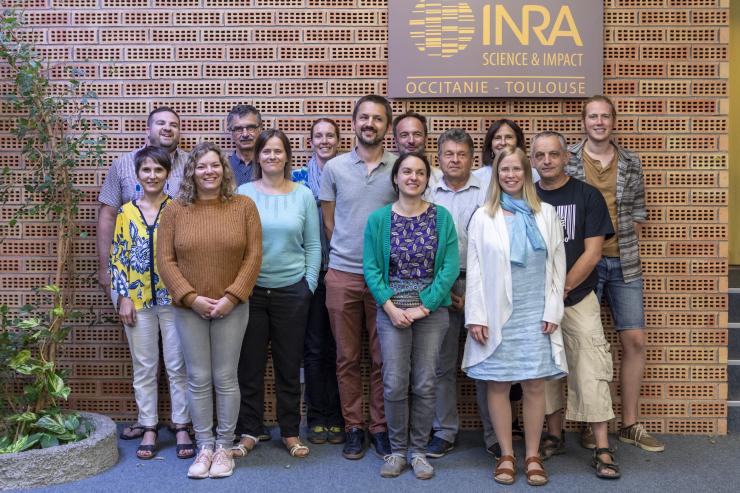
Agroecology Reading time 5 min
Guillaume Martin, agroecology in full swing
Published on 21 November 2019
For Guillaume, everything is related… at home, he grows organic fruits and vegetables. In his own garden, he keeps one foot in agroecology, the field his research continually tills. For the past ten years at INRA, he has been monitoring climate change and economic and regulatory fluctuations that take a toll on livestock farms, compromising their resilience. Grazing animals play a fundamental role in agroecology. “Grasslands, alone or in rotation with crops, bring many benefits: they stock carbon in the soil, improve soil structure and fertility, and curb the growth of weeds”, he explains.
Of systemic agriculture and serious play
As opposed to targeted research, Guillaume’s approach is systemic. After several years spent observing the conversion of dairy cattle farms to organic models, he detected an improvement in their resilience, provided that the transition toward autonomous and economical grassland systems is made with unwavering resolve. To this end, he developed a method to assess the resilience of livestock farms.
Guillaume has also explored other levers of resilience as well, for example agreements between cereal growers and livestock farmers to integrate crops and livestock, which would lighten up the overall environmental footprint. He ran an international comparison of case studies in order to characterise factors that influence the emergence and results of cooperation between cereal growers and breeders, such as clear rules (e.g. prices, quantities and delivery deadlines).
Guillaume is one of the first agronomists ever to develop a “serious game” known as Rami Fourrager®, or Forage Rummy, to ease the transition of grazing livestock, especially toward agroecology. The game helps farmers come together to imagine and simulate the consequences of technical and organisational changes on their farms.
The freedom to explore, the desire to share
Guillaume’s ambition is two-fold: come up with original concepts, methods and knowledge for farmers and agricultural consultants, with whom he forges lasting partnerships. When it comes to research – both training people to do it and doing it himself – he is a particularly active player. “I especially like to get students involved in my projects. They play an important role in advancing my research. I strive to train them in the main aspects of the agriculture I practice: establishing strong ties in the field and with partners and staying open to a cross-disciplinary approach”.
The participation of livestock players is key
The winner of this award enjoys sharing his systemic agricultural approach with others in the Institute. First and foremost with his team, whose diversity is too valuable an asset in a stimulating scientific environment not to seize upon the opportunity to test the adaptability of framework ideas, knowledge, and methods. For Guillaume, the award is the pay-off for his efforts, and in particular for the risks he took early on in his career in choosing his field of study.
What's next?
Guillaume intends to keep the same enthusiasm for his work thanks to interesting projects, while enjoying the same freedom he has always had to follow through with his intuition. He works on several emerging topics: design and analysis of more diversified farms (e.g. multi-crop and multi-livestock) and more collective forms of agriculture (e.g. with cooperation between growers and breeders), and assessing their impact on agricultural and breeding practices and the performance of farms. This assessment phase is crucial to forecasting the consequences of applying these new agricultural models across the board within the framework of the agroecological transition.

- 37 years old, in a civil union, 1 child
- Since 2019: co-editor-in-chief of the scientific journal Agricultural Systems (AGSYS)
- Since 2018: leader of one of five scientific challenges of INRA’s Environment and Agronomy Division: design and management of multi-performance agricultural systems
- Since 2017: leader of the MAGELLAN team (agroecological transition of farms in territories), AGIR joint research unit, INRA Occitanie-Toulouse
- Since 2010: research director at INRA’s Occitanie-Toulouse Centre Joint Research Unit for Agroecology, Innovations and Territories (AGIR)
- 2006-2009: Doctoral thesis at INRA Occitanie-Toulouse, AGIR research unit, “Analysis and design of flexible forage systems by systemic modelling and dynamic simulation” co-supervised by Michel Duru & Roger Martin Clouaire
- 2006: Masters in Plant Sciences, major in Crop Science, University of Wageningen
Awards and distinctions
- 2019 INRA Promising Researcher Award
Hobbies
- Organic gardening and cooking the fruits of his labour
